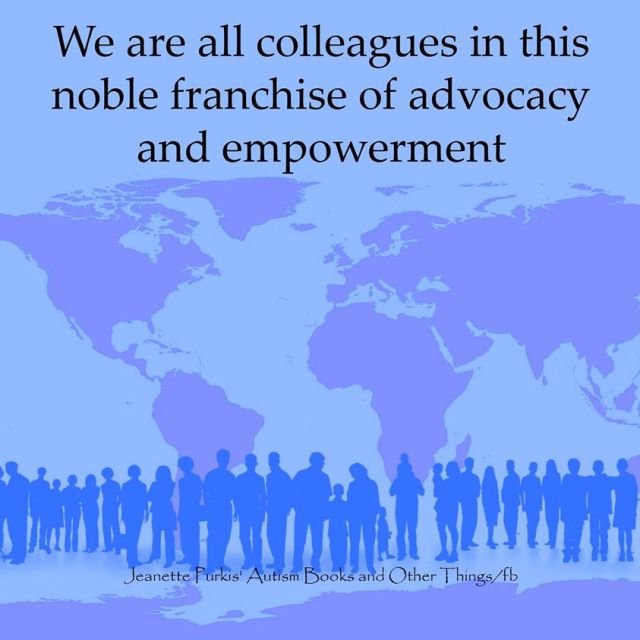I had a bit of a personal criticism of my work today. The complainer saw my work as somehow gelling autism and mental illness together. Apparently I have no right to ‘speak for’ autistic people because my mental illness somehow muddies the waters or cancels it out. Or something. I have had a few of these criticisms which are pretty unhelpful and I won’t waste my time or yours going into the ins and outs. Going beyond the criticism and trolling aspect, these comments highlight an issue I come across which relates to more people than just me: The idea that advocates and activists are ‘speaking for’ autistics and that they should be required to satisfy some criteria to be worthy enough to do this.
There are a few versions of this and they come from some very varied quarters. They include:
- ‘Parts of your experience (e.g. mental illness) disqualify you from speaking for autistic people because your experience is not ‘truly’ autistic
- ‘You are nothing like my autistic child. You cannot speak for my child’.
- ‘You are not (or alternatively ‘you are too’) political enough to speak for autistics.’
- ‘Your autism is pretty mild. I don’t think you should get to make commentary on autism given how successful your life is.’
Massive Oh Dear at all of these! They are all quite offensive and invalidating and oddly enough I have been on the receiving end of all four. The main issue in all of them seems to me to be the same: there is some quality of autistic-ness which autistic people speaking about autism need to satisfy in order to be allowed to speak on behalf of the community. These attitudes are really unhelpful and discourage some autistic people from doing or saying anything in advocacy,
In fact, underpinning all these statements is the idea an individual speaks for all autistics or on behalf of us all. This is complete nonsense. When I – or I imagine any of my colleagues – get up on stage to speak on autism I’m, fairly certain we are talking about our own knowledge and hoping that others can relate to that. I have never said and I will never say that I speak on behalf of anyone, autistic or otherwise. I can’t. I am not them. Sometimes people say they are happy for me to speak on their behalf which is very lovely and affirming but I never actually consciously think I’m speaking for another person or people. I share what I know and hope that others can pick up useful things from it.
Beyond the logic of the thing, the statements outlined above all come with a good whack of prejudice and / or ableism. They are not respectful. Considering how difficult it is for so many of us to speak up and be heard, having others trying to shoot us down in flames isn’t very useful for anyone.
The more autistic people who speak publicly, write, engage in decision-making and do all the other things which are part of advocacy and / or activism, the better. However some people are put off after seeing trolling and harsh criticism levelled at their peers and colleagues.
In terms of my own representation, being criticised for speaking on mental illness and autism when a lot of my personal experience and professional experience relates to autism AND mental illness is a bit baffling. Intersectionality – that very helpful idea that people experience discrimination related to the intersection of a number of attributes. So for me, any intersectional groups are Autistic person, person with schizophrenia, woman, and person who identifies and Queer / asexual. The idea that one should ‘just’ be autistic in order to speak and write confuses me. Should Autistic people with other, different intersectional experiences not advocate either? I think the more of us there are speaking from understanding informed by our different perspectives then that is a really good thing as it will help with inclusion and more fulsome representation.
Finally, I have to wonder who it is that gets to decide what advocates say and do and who they ‘should’ be. My work was borne out of an autobiography which thrust me into the autism world in 2005, when I knew very little about anything and Q&A sessions after my talks filled me with terror as I was worried that I couldn’t answer all the questions. I had no ulterior motive then and I don’t have one now. I did what I do to help make things inclusive and respectful and to try to help improve some of the huge disparities and disadvantages we experience. I imagine that most of the other advocates out there have a similar motivation. To be criticised and told essentially that I am not ‘pure’ enough to talk to people about autism is just insulting and rude.
I don’t really don’t represent anyone other than myself. I am at a point in my life where trolling and keyboard warriors result in anger and blocking rather than me turning their nastiness inwards. However these experiences will be putting other people off saying anything and making them fearful to speak out at all. I don’t like to think of that. It is as if the people criticising those for representing ‘wrong’ are themselves speaking on behalf of all of us and silencing voices of others who could make a positive change. 



